10 reasons
Re: 10 reasons
Hmm... What's that noise i hear  Why, it sounds like Shake-n spears rattling
Why, it sounds like Shake-n spears rattling  This could get exciting
This could get exciting 

To find the Truth, you must go Beyond.
Re: 10 reasons
Art wrote:
If he was adopted by aristocrats (which is a ridiculous idea in the first place)
http://www.shakespeare-online.com/faq/kingsmen.html wrote:
In 1603, Queen Elizabeth I died and James the VI of Scotland became the new monarch, King James I of England. James loved the arts and was very generous to actors, playwrights, and other performers of the day.
In particular, James I loved the theatre, and was captivated by Shakespeare's acting troupe, the Chamberlain's Men.
Within ten days of arriving in London, James insisted that Shakespeare's troupe come under his own patronage. So they were granted a royal patent and changed their name to the King's Men, in honour of James.
If Shakespeare was not adopted by the aristocracy, he was perhaps adopted by king James I!It was indeed lucky for the King's Men that James held them in such high regard, for in 1603, England saw its worst outbreak of the plague in decades, and all the theatres had to be closed. Shakespeare and his troupe were not out of work, however, because James provided them with many engagements, performing for royalty outside of the infected London area.
Ann
Color Commentator
Re: Shakespeare, the conventional dramatist
Shakespeare was a conventional fellow in some respects. He was certainly conventional in that he followed the rule, which had been established in the antique Greek drama, that tragedies are about noble people from the upper classes and comedies are about the vulgar people from the underclass.
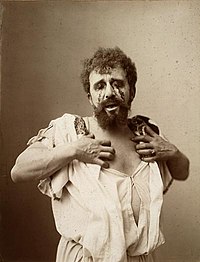 So the Greek tragedies are full of kings and noble men who suffer greatly, often through no fault of their own. Take Oedipus, for example - King Oedipus, Oedipus Rex. Born into a royal family (or course) and then left to die because of a curse, but instead adopted by another family who also happened to be royal (of course), Oedipus killed a stranger when he was on his way to Thebe. Surely that is what each and every one of us could have done? Killed a stranger, and then continued on our way as if nothing had happened?
So the Greek tragedies are full of kings and noble men who suffer greatly, often through no fault of their own. Take Oedipus, for example - King Oedipus, Oedipus Rex. Born into a royal family (or course) and then left to die because of a curse, but instead adopted by another family who also happened to be royal (of course), Oedipus killed a stranger when he was on his way to Thebe. Surely that is what each and every one of us could have done? Killed a stranger, and then continued on our way as if nothing had happened?
 As poor Oedipus realizes that the stranger that he killed in all innocence was actually his father, the poor fellow tears out his own eyes to repent. (Oh yes... there was the little detail of him marrying the widow of the stranger he killed in all innocence, the widow who happened to be his mother...)
As poor Oedipus realizes that the stranger that he killed in all innocence was actually his father, the poor fellow tears out his own eyes to repent. (Oh yes... there was the little detail of him marrying the widow of the stranger he killed in all innocence, the widow who happened to be his mother...)
 And then there is Heracles or Hercules, the greatest of all Greek heroes, the son of the King of the gods, Zeus, and a human queen.
And then there is Heracles or Hercules, the greatest of all Greek heroes, the son of the King of the gods, Zeus, and a human queen.
Did you know that Hercules killed his wife and children? Oh, but that wasn't his fault, really. It was Hera, the goddess of jealousy, who sent a fit of madness on Hercules so that he killed his family. So you can see that it wasn't his fault. But in order to do penance, he had to carry out twelve amazing feats of bravery and strength, which he did most admirably!! Yeah!!!
 What about Odysseus, the king of the island of Ithaca? He had to leave his home in order to go to Troy and take part in the war against Troy. When the Greeks had finally won, after ten years and thanks to Odysseus (the Trojan horse, you know), Odysseus set sail again to return home with his 1,000 men. It took him ten years and 1,000 men to make it back to Ithaca - in other words, his men died, all 1,000 of them. So what? Odysseus survived, and his men weren't royalty.
What about Odysseus, the king of the island of Ithaca? He had to leave his home in order to go to Troy and take part in the war against Troy. When the Greeks had finally won, after ten years and thanks to Odysseus (the Trojan horse, you know), Odysseus set sail again to return home with his 1,000 men. It took him ten years and 1,000 men to make it back to Ithaca - in other words, his men died, all 1,000 of them. So what? Odysseus survived, and his men weren't royalty.
In order to be truly tragic, truly deserving of honor and grief, you had to be a king. That was the rule of the Greek drama.
 And Shakespeare, standing on the shoulders of old Greek giants, followed in their footsteps (what a wonderfully mixed metaphor
And Shakespeare, standing on the shoulders of old Greek giants, followed in their footsteps (what a wonderfully mixed metaphor  ). And that's an important reason why all his tragic heroes are kings or princes, or otherwise belong to the aristocracy.
). And that's an important reason why all his tragic heroes are kings or princes, or otherwise belong to the aristocracy.
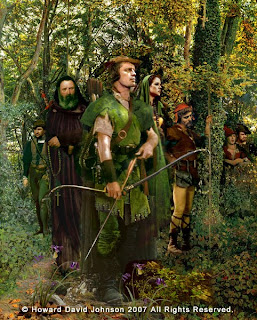 Bear in mind, too, that Shakespeare rarely if ever came up with his own plots. He used already-existing tragic and dramatic stories, which he then turned into plays. And how many stories do you think existed back in the 16th and 17th century about peasants and other ordinary people who were such tragic heroes that they deserved to be the protagonists of one of Shakespeare's plays? There were no such stories around, I believe. Even Robin Hood originally belonged to the aristocracy, or so I believe anyway. Nevertheless, Shakespeare could have tried to turn Robin Hood into a tragic hero in one of his plays, but he never did. Interesting.
Bear in mind, too, that Shakespeare rarely if ever came up with his own plots. He used already-existing tragic and dramatic stories, which he then turned into plays. And how many stories do you think existed back in the 16th and 17th century about peasants and other ordinary people who were such tragic heroes that they deserved to be the protagonists of one of Shakespeare's plays? There were no such stories around, I believe. Even Robin Hood originally belonged to the aristocracy, or so I believe anyway. Nevertheless, Shakespeare could have tried to turn Robin Hood into a tragic hero in one of his plays, but he never did. Interesting.
All in all, Shakespeare was a conventional "creator of literature" when he always chose kings, princes or other aristocrats to be the protagonists of his tragedies.
Ann



Did you know that Hercules killed his wife and children? Oh, but that wasn't his fault, really. It was Hera, the goddess of jealousy, who sent a fit of madness on Hercules so that he killed his family. So you can see that it wasn't his fault. But in order to do penance, he had to carry out twelve amazing feats of bravery and strength, which he did most admirably!! Yeah!!!

In order to be truly tragic, truly deserving of honor and grief, you had to be a king. That was the rule of the Greek drama.


All in all, Shakespeare was a conventional "creator of literature" when he always chose kings, princes or other aristocrats to be the protagonists of his tragedies.
Ann
Color Commentator
- neufer
- Vacationer at Tralfamadore
- Posts: 18805
- Joined: Mon Jan 21, 2008 1:57 pm
- Location: Alexandria, Virginia
Re: Shakespeare, the conventional dramatist
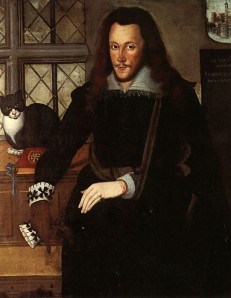
- THOMA(s) SNOUT
Vulgar people from the underclass show up in Shake-speare comedies & tragedies equally. They all have delightful names like Bullcalf, Costard, Dogberry, Dull, Elbow, Fang, Feeble, Snout, Froth, Mouldy, Nym, Sly, Pinch, Pistol, Quince, Starveling, Shadow, Wart, Abhorson, Bottom, Boult, Shallow, Simple, Snare. Many were veiled references to aristocrats, e.g.:Ann wrote:Shakespeare was a conventional fellow in some respects. He was certainly conventional in that he followed the rule, which had been established in the antique Greek drama, that tragedies are about noble people from the upper classes and comedies are about the vulgar people from the underclass.
- THOMA(s) SNOUT
SOUTHAMPTON
Art Neuendorffer
Will, the conventional comedian
Not only was William Shakespeare conventional in choosing kings and princes as his tragic heroes, he was also conventional in his choice of people from the underclass as the characters intended to make you laugh.
 Because while the kings of old Greece loved to see their own suffering blown up to heartbreakingly heroic proportions in the Greek tragedies, they weren't interested in feeling sorry for lowly peasants, slaves and the like. These people had to be the butt of jokes instead, to the amusement of the kings.
Because while the kings of old Greece loved to see their own suffering blown up to heartbreakingly heroic proportions in the Greek tragedies, they weren't interested in feeling sorry for lowly peasants, slaves and the like. These people had to be the butt of jokes instead, to the amusement of the kings.
I have to admit that I have only seen one ancient Greek comedy, Lysistrata by Aristophanes. The heroine of the comedy is an intelligent and determined woman with a mission, burt most of the rest of the characters are rather simple people with very big libidos.
An interesting character from the ancient Greek mythology is King Midas. Fascinatingly, while Midas is generally acknowledged to have been the son of a king, there is at least one dissenting voice. http://en.wikipedia.org/wiki/Midas wrote:
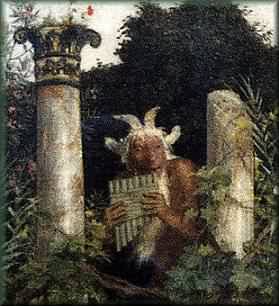 Ovid tells the story of how Midas took care of the wine god Dionysus' old foster father, and as a reward, Dionysus granted Midas the ability to turn everything he touched into gold. Of course the gift turned out to be catastrophic. Dionysus helped him get rid of it, and after that, Midas had lost all his former appetite for gold and riches. Instead he became a lover of nature, particularly of the forest, and he worshipped Pan, a lowly god of the fields and a satyr.
Ovid tells the story of how Midas took care of the wine god Dionysus' old foster father, and as a reward, Dionysus granted Midas the ability to turn everything he touched into gold. Of course the gift turned out to be catastrophic. Dionysus helped him get rid of it, and after that, Midas had lost all his former appetite for gold and riches. Instead he became a lover of nature, particularly of the forest, and he worshipped Pan, a lowly god of the fields and a satyr.
 Once there was a music competition between Pan, the lowly satyr, and Apollo, one of the really top dog gods, clearly one of the "royal family" of the gods. Because Apollo was such an illustrious god and Pan was just a satyr, eveyone agreed that Apollo had won the music competition - everyone, that is, except Midas! But Apollo would not accept such a slight from a mere human, so he punished Midas by giving him a pair of donkey's ears.
Once there was a music competition between Pan, the lowly satyr, and Apollo, one of the really top dog gods, clearly one of the "royal family" of the gods. Because Apollo was such an illustrious god and Pan was just a satyr, eveyone agreed that Apollo had won the music competition - everyone, that is, except Midas! But Apollo would not accept such a slight from a mere human, so he punished Midas by giving him a pair of donkey's ears.
By choosing Pan over Apollo, Midas betrayed the idea that a "king" or a "prince" is always better than a person of lowly descent. By making his choice, Midas betrayed his own class, the class of kings, and changed from a potentially tragic hero into a ridiculous character.
 Now see how Shakespeare picks up the idea of ridiculing a person by giving him donkey's ears in his comedy A Midsummer Night's Dream. A simple weaver with the silly name of Nick Bottom is given donkey's ears, while at the same time Titania, Queen of the Fairies, is also turned into an object of ridicule as she is put under a spell and forced to love the simple weaver with the donkey ears.
Now see how Shakespeare picks up the idea of ridiculing a person by giving him donkey's ears in his comedy A Midsummer Night's Dream. A simple weaver with the silly name of Nick Bottom is given donkey's ears, while at the same time Titania, Queen of the Fairies, is also turned into an object of ridicule as she is put under a spell and forced to love the simple weaver with the donkey ears.
 Oh, and by the way, don't you think Shakespeare has put Pan in A Midsummer Night's Dream, too? Isn't Puck Pan?
Oh, and by the way, don't you think Shakespeare has put Pan in A Midsummer Night's Dream, too? Isn't Puck Pan? 
So when Shakespeare made his funny characters come from the lower classes, at least most of them, he followed in the footsteps of the storytellers and dramatists of ancient Greece. Because Midas may have been a king, but he may also have been the son of a peasant, and in the end he renounced his own kingly splendour and the "royal god Apollo" for nature and a satyr, and so he returned to his peasant roots. As a punishment he was made ridiculous.
So to summarize: Yes, Shakespeare was a brown-noser, and yes, he can be regarded as a traitor to his own class. After all, Nick Bottom was a weaver, and Shakespeare's own father was a glove-maker: what's the big difference?
But Shakespeare adapted his tragedies and comedies according to well-established "rules" of what is tragic and what is ridiculous. For a man who was bad at coming up with his own plots, stealing old stories along with at least some of the old morals may have come natural to him.
Ann

I have to admit that I have only seen one ancient Greek comedy, Lysistrata by Aristophanes. The heroine of the comedy is an intelligent and determined woman with a mission, burt most of the rest of the characters are rather simple people with very big libidos.
An interesting character from the ancient Greek mythology is King Midas. Fascinatingly, while Midas is generally acknowledged to have been the son of a king, there is at least one dissenting voice. http://en.wikipedia.org/wiki/Midas wrote:
The suggestion that Midas might have been the son of a peasant is a signal that a less than heroic fate is awaiting him.Arrian gives an alternative story of the descent and life of Midas. According to him, Midas was the son of Gordios, a poor peasant, and a Telmissian maiden of the prophetic race.


By choosing Pan over Apollo, Midas betrayed the idea that a "king" or a "prince" is always better than a person of lowly descent. By making his choice, Midas betrayed his own class, the class of kings, and changed from a potentially tragic hero into a ridiculous character.


So when Shakespeare made his funny characters come from the lower classes, at least most of them, he followed in the footsteps of the storytellers and dramatists of ancient Greece. Because Midas may have been a king, but he may also have been the son of a peasant, and in the end he renounced his own kingly splendour and the "royal god Apollo" for nature and a satyr, and so he returned to his peasant roots. As a punishment he was made ridiculous.
So to summarize: Yes, Shakespeare was a brown-noser, and yes, he can be regarded as a traitor to his own class. After all, Nick Bottom was a weaver, and Shakespeare's own father was a glove-maker: what's the big difference?
But Shakespeare adapted his tragedies and comedies according to well-established "rules" of what is tragic and what is ridiculous. For a man who was bad at coming up with his own plots, stealing old stories along with at least some of the old morals may have come natural to him.
Ann
Last edited by Ann on Tue Oct 25, 2011 2:42 am, edited 1 time in total.
Color Commentator
- neufer
- Vacationer at Tralfamadore
- Posts: 18805
- Joined: Mon Jan 21, 2008 1:57 pm
- Location: Alexandria, Virginia
small Latine, and lesse Greeke
----------------------------------------------------Ann wrote:
So when Shakespeare made his funny characters come from the lower classes, at least most of them, he followed in the footsteps of the storytellers and dramatists of ancient Greece.
Passages from Aubrey's Brief Lives about Shakespeare:
Though, as Ben: Johnson sayes of him:
- And though thou hadst small Latine, and lesse Greeke,
From thence to honour thee, I would not seeke
For names; but call forth thund'ring Æschilus,
Euripides, and Sophocles to us,
for he had been in his younger yeares a schoolmaster in the countrey.
—from Mr. . . . Beeston (Vol. II, p. 225-227)
----------------------------------------------------
http://shakespeare.palomar.edu/life.htm
Digges commendatory poem to the 1640 edition of Poems:
Written by Wil. Shakespeare, Gent. (1623? - 1635):
......................................................
Vpon Master WillIAM S H A K E S P E A R E,
the Deceased Authour, and his P O E M S .
Poets are borne not {M}ade, when I would prov{E}
This truth, the glad r[E]memberance I must lo[V]e
Of never dying Shak[E]speare, who alone,
Is agument enough to mak[E] that one.
First, that he was a Poet none would doubt,
That heard th’applause of what he sees set out
Imprinted; where thou hast (I will not say
Reader his Workes for to contrive a Play:
To him twas none) the patterne of all wit,
Art without Art unparaleld as yet.
Next Nature onely helpt him, for looke thorow
This whole Booke, thou shalt find he doth not borrow,
One phrase from Greekes, nor Latines imitate,
.....................................................
W I L L I A M S H A K E S P E A __ [R] E
.....................................................
Code: Select all
__________ <= 18 =>
P o e t s a r e b o r n e n o t___ {M} a
d e w h e n I w o u l d p r o v__ {E} - T
H i s t r u t h t h e g l a d r______ [E] {M]
E m b e r a n c e I m u s t l o__ [V] {E}
O f n e v e r d y i n g S h a k___ [E] s
p e a r e w h o a l o n e I s a__ [R] g
u m e n t e n o u g h t o m a k [E] - t
h a t o n e
{In the 17th column of 18 Earls of Oxford}Art Neuendorffer
Shakespeare, the poet describing human nature
I have previously said that Shakespeare probably wasn't much good at wielding the quill at all, and that he might have been quite unable to write his own plays down. I have also said that he couldn't, or wouldn't, come up with his own plots. I have also said that he almost certainly lacked much of the background information he needed in order to make his plays believable, and that others had to give him that background information. That's a lot of things that Shakespeare didn't have or couldn't do.
 So what was it that he did have and could do, then?
So what was it that he did have and could do, then?
One thing is obvious. Shakespeare was very good at turning an old story into a play.
More than that, however, he was extremely good at seeing through human nature.

Why is a character like Hamlet so fascinating? It is because Hamlet is so extremely hard to pin down.
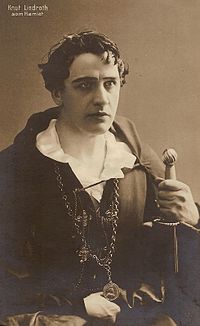 Hamlet wants to kill himself...
Hamlet wants to kill himself...

...He plays mad...
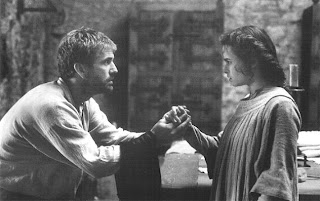
He seems to love Ophelia...

..but the next moment he attacks her...

He is going to kill Claudius, his father's murderer, but he withdraws his attack because Claudius is praying...
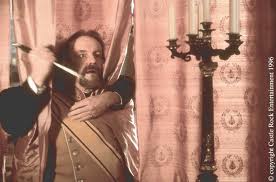 ...but he doesn't hesitate as he quickly stabs a person hidden behind a curtain, thereby killing Ophelia's father, Polonius (and instead of saying sorry, he immediately starts scolding his mother Gertrude...)
...but he doesn't hesitate as he quickly stabs a person hidden behind a curtain, thereby killing Ophelia's father, Polonius (and instead of saying sorry, he immediately starts scolding his mother Gertrude...)
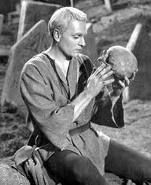 Yet the picture that remains with us, after all the sound and the fury, is the thoughtful young man talking to a skull.
Yet the picture that remains with us, after all the sound and the fury, is the thoughtful young man talking to a skull.
The Swedish poet Gunnar Ekelöf wrote a poem which begins like this, in my own rough translation:
Every man is a world, populated
by blind beings in dark rebellion
against the kingly "I" who reigns over them.
That is how I see Hamlet. He is a man full of conflicting impulses. Sometimes his "I" rules, but often one of those dark beings takes command. Hamlet is the man who can shout "Get thee to a nunnery, Ophelia", and yet insist that he loved her "more than forty thousand brothers" when he learns that she is dead, probably because she killed herself after he rejected her and killed her father.
What makes Hamlet so immediate and direct is that the story about him is a play. There is no all-knowing narrator in the background who can give us fair warning by informing us that Hamlet has suddenly become very angry because he remembers this or that. Everything just happens before our very eyes as Hamlet speaks and acts on stage. We have to try to understand it. It's just like life: it just unfolds as we are watching, and there is no all-knowing narrator to explain things to us.
So Hamlet, I think, makes sense to us in the same way as life makes sense to us. Or not.
 Because every human being is a world, a universe, darkly populated by beings barely under his or her control. Shakespeare understood that, and never has he shown it so clearly as he did in Hamlet. Amazing.
Because every human being is a world, a universe, darkly populated by beings barely under his or her control. Shakespeare understood that, and never has he shown it so clearly as he did in Hamlet. Amazing.
Ann

One thing is obvious. Shakespeare was very good at turning an old story into a play.
More than that, however, he was extremely good at seeing through human nature.

Why is a character like Hamlet so fascinating? It is because Hamlet is so extremely hard to pin down.


...He plays mad...

He seems to love Ophelia...

..but the next moment he attacks her...

He is going to kill Claudius, his father's murderer, but he withdraws his attack because Claudius is praying...


The Swedish poet Gunnar Ekelöf wrote a poem which begins like this, in my own rough translation:
Every man is a world, populated
by blind beings in dark rebellion
against the kingly "I" who reigns over them.
That is how I see Hamlet. He is a man full of conflicting impulses. Sometimes his "I" rules, but often one of those dark beings takes command. Hamlet is the man who can shout "Get thee to a nunnery, Ophelia", and yet insist that he loved her "more than forty thousand brothers" when he learns that she is dead, probably because she killed herself after he rejected her and killed her father.
What makes Hamlet so immediate and direct is that the story about him is a play. There is no all-knowing narrator in the background who can give us fair warning by informing us that Hamlet has suddenly become very angry because he remembers this or that. Everything just happens before our very eyes as Hamlet speaks and acts on stage. We have to try to understand it. It's just like life: it just unfolds as we are watching, and there is no all-knowing narrator to explain things to us.
So Hamlet, I think, makes sense to us in the same way as life makes sense to us. Or not.

Ann
Color Commentator
Re: Shakespeare, the spoken word magician
Apart from being able to create fantastically complex and evolving characters, Shakespeare had one more truly outstanding talent. He had an incredible way with words.
Spoken words, that is.
Roland Emmerich, the director, wondered why Shakespeare didn't teach his daughters to read, so that they could read his plays.
But Shakespeare didn't teach his daughters to read his plays, because his plays weren't meant to be read. They were meant to be performed to a live audience. They words in them were meant to be spoken aloud, and the plot and characters were meant to be brought alive by the living, breathing, moving, speaking actors.
Roland Emmerich, you are a movie director yourself. What do you prefer, that your audience read your scripts or that they actually see (and hear) your movies?
Shakespeare was like you. He created an experience for an audience, and experience full of images and sounds.
Unlike you, Shakespeare didn't have a camera or any sort of recording equipment. Unlike you, he didn't have many props. He didn't have any special effects at all.
But he did have one thing: Words. Spoken words. Cascades of words, washing over his audience.

When Shakespeare made spoken words, magic came out of the wand he didn't have.

Words flowed out of Shakespeare's mind, branching like the limbs of a tree, giving him the largest vocabulary of any poet in English history.
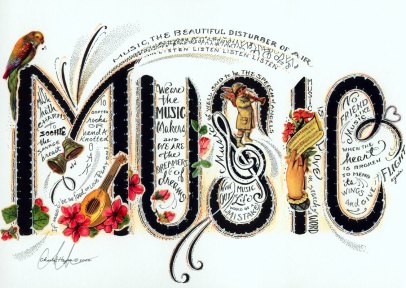
Shakespeare composed music with his words.

He painted the world with his words.
I googled "Shakespeare quotes" and got 2,540,000 hits.
Oh yes, Shakespeare has made his mark. With words.
The spoken word champion, the master composer of symphonies of spoken words, that was Shakespeare.
Ann
Spoken words, that is.
Roland Emmerich, the director, wondered why Shakespeare didn't teach his daughters to read, so that they could read his plays.
But Shakespeare didn't teach his daughters to read his plays, because his plays weren't meant to be read. They were meant to be performed to a live audience. They words in them were meant to be spoken aloud, and the plot and characters were meant to be brought alive by the living, breathing, moving, speaking actors.
Roland Emmerich, you are a movie director yourself. What do you prefer, that your audience read your scripts or that they actually see (and hear) your movies?
Shakespeare was like you. He created an experience for an audience, and experience full of images and sounds.
Unlike you, Shakespeare didn't have a camera or any sort of recording equipment. Unlike you, he didn't have many props. He didn't have any special effects at all.
But he did have one thing: Words. Spoken words. Cascades of words, washing over his audience.

When Shakespeare made spoken words, magic came out of the wand he didn't have.

Words flowed out of Shakespeare's mind, branching like the limbs of a tree, giving him the largest vocabulary of any poet in English history.

Shakespeare composed music with his words.

He painted the world with his words.
I googled "Shakespeare quotes" and got 2,540,000 hits.
Oh yes, Shakespeare has made his mark. With words.
The spoken word champion, the master composer of symphonies of spoken words, that was Shakespeare.
Ann
Last edited by Ann on Wed Oct 26, 2011 4:00 am, edited 2 times in total.
Color Commentator
- neufer
- Vacationer at Tralfamadore
- Posts: 18805
- Joined: Mon Jan 21, 2008 1:57 pm
- Location: Alexandria, Virginia
Re: Shakespeare, the poet describing human nature
It only scratches the surface:Ann wrote:
I have previously said that Shakespeare probably wasn't much good at wielding the quill at all, and that he might have been quite unable to write his own plays down. I have also said that he couldn't, or wouldn't, come up with his own plots. I have also said that he almost certainly lacked much of the background information he needed in order to make his plays believable, and that others had to give him that background information. That's a lot of things that Shakespeare didn't have or couldn't do.
http://www.doubtaboutwill.org/debate wrote:
Actor Mark Rylance, Chairman of the Shakespearean Authorship Trust,
replies to Prof. Wells' criticisms in a letter to the editor of The Stage magazine:
...............................................
Prof. Wells: “They reiterate nonsense about the level of education revealed by the works without reference to the scholarly studies that have shown that this level is entirely within the compass of anyone who had received a grammar school education.”
Mark Rylance: That an enormous range of knowledge is found in the works is not “nonsense,” and Wells questions no specific area of knowledge mentioned in the declaration. The list includes: “law, philosophy, classical literature, ancient and modern history, mathematics, astronomy, art, music, medicine, horticulture, heraldry, military and naval terminology and tactics; etiquette and manners of the nobility; English, French and Italian court life; Italy, and aristocratic pastimes such as falconry, equestrian sports and royal tennis.”
Art Neuendorffer
Re: Shakespeare, the poet describing human nature
http://en.wikipedia.org/wiki/William_Shakespeare wrote:neufer wrote:It only scratches the surface:Ann wrote:
I have previously said that Shakespeare probably wasn't much good at wielding the quill at all, and that he might have been quite unable to write his own plays down. I have also said that he couldn't, or wouldn't, come up with his own plots. I have also said that he almost certainly lacked much of the background information he needed in order to make his plays believable, and that others had to give him that background information. That's a lot of things that Shakespeare didn't have or couldn't do.http://www.doubtaboutwill.org/debate wrote:
Actor Mark Rylance, Chairman of the Shakespearean Authorship Trust,
replies to Prof. Wells' criticisms in a letter to the editor of The Stage magazine:
...............................................
Prof. Wells: “They reiterate nonsense about the level of education revealed by the works without reference to the scholarly studies that have shown that this level is entirely within the compass of anyone who had received a grammar school education.”
Mark Rylance: That an enormous range of knowledge is found in the works is not “nonsense,” and Wells questions no specific area of knowledge mentioned in the declaration. The list includes: “law, philosophy, classical literature, ancient and modern history, mathematics, astronomy, art, music, medicine, horticulture, heraldry, military and naval terminology and tactics; etiquette and manners of the nobility; English, French and Italian court life; Italy, and aristocratic pastimes such as falconry, equestrian sports and royal tennis.”
And Shakespeare might have had someone, or maybe several people, who helped him with the rest. Why not? Who is to say that he wasn't the sort of person who learnt, when he was in London, to find the sort of people who would help him with these things?Grammar schools varied in quality during the Elizabethan era, but the curriculum was dictated by law throughout England,[13] and the school would have provided an intensive education in Latin grammar and the classics.
Ann
Color Commentator
Shakespeare the poet
http://en.wikipedia.org/wiki/William_Shakespeare wrote:
 The sonnets are interesting in that they are short - well, they all consist of fourteen lines each! - and they require no plot. If Shakespeare was not good at coming up with plots, and if he had no energy for the complex crafting of characters any more, then the sonnets should have been perfect for him. Here he could wield his word magic without being burdened with a lot of extra "literary baggage". So it's interesting that he apparently didn't write any sonnets, either, after 1613, or even after 1609.
The sonnets are interesting in that they are short - well, they all consist of fourteen lines each! - and they require no plot. If Shakespeare was not good at coming up with plots, and if he had no energy for the complex crafting of characters any more, then the sonnets should have been perfect for him. Here he could wield his word magic without being burdened with a lot of extra "literary baggage". So it's interesting that he apparently didn't write any sonnets, either, after 1613, or even after 1609.
 But there could be several reasons for that, too. I'll come to that.
But there could be several reasons for that, too. I'll come to that.
Later, alligator.
Ann
Perhaps Shakespeare's "secretary" helped him write down these poems, assuming I'm correct that Shakespeare was neither fond of nor good at the act of writing.In 1593 and 1594, when the theatres were closed because of plague, Shakespeare published two narrative poems on erotic themes, Venus and Adonis and The Rape of Lucrece.
This suggests that no Shakespearean sonnets exist that can be dated to a time after 1609. Perhaps Shakespeare's "secretary" had died, retired or had had a falling-out with Shakespeare.Published in 1609, the Sonnets were the last of Shakespeare's non-dramatic works to be printed.


Later, alligator.
Ann
Color Commentator
- neufer
- Vacationer at Tralfamadore
- Posts: 18805
- Joined: Mon Jan 21, 2008 1:57 pm
- Location: Alexandria, Virginia
Re: Shakespeare, the poet describing human nature
Common Sense.Ann wrote:
Shakespeare might have had someone, or maybe several people, who helped him with the rest. Why not? Who is to say that he wasn't the sort of person who learnt, when he was in London, to find the sort of people who would help him with these things?
Art Neuendorffer
- neufer
- Vacationer at Tralfamadore
- Posts: 18805
- Joined: Mon Jan 21, 2008 1:57 pm
- Location: Alexandria, Virginia
Re: Shakespeare the poet
Are you just trying to be contrary, Ann, or do really believe in the illiterate Stratford boob?Ann wrote:This suggests that no Shakespearean sonnets exist that can be dated to a time after 1609.Published in 1609, the Sonnets were the last of Shakespeare's non-dramatic works to be printed.
Perhaps Shakespeare's "secretary" had died, retired or had had a falling-out with Shakespeare.
http://www.drjsferris.com/
Art Neuendorffer
Re: 10 reasons
Art, I'm a teacher. I know, believe me, that when it comes to reading, writing, speaking, listening and acting, some people have great gifts and great shortcomings at the same time.
I had a kid in my class last year who could barely write a word of English. (He did okay writing in Swedish.) But he was good, indeed quite good, at hearing and understanding spoken English.
I have had kids who can't write much if they don't have access to a computer, but if they are allowed to use a computer as a typewriter (a computer with no internet and no USBs) they can write well enough. I have seen kids who have lovely handwriting and will do their homework meticulously, but who aren't smart and can't do anything that hasn't been part of their homework. I have seen kids who are absolutely great at presenting things orally in front of the class, but are bad at writing. I have seen kids who are talented actors, but who can't concentrate enough to do much writing. I have seen kids who are great at writing, but are stiff and nervous when they have to talk. I have seen kids who like reading, but dislike writing. I have seen kids who love writing their own stories (not necessarily good stories, but their own), but they have disliked reading. I've seen it all!
I'm not suggesting that Shakespeare was illiterate. I haven't had a single kid who was illiterate. But I have had lots of kids who have disliked writing.
 What I'm saying about Shakespeare is that he probably disliked the physical act of writing, not that he couldn't read. Of course he could read! Of course he must have done quite a lot of reading, too, because otherwise there is no way that he could have had the vocabulary that he had.
What I'm saying about Shakespeare is that he probably disliked the physical act of writing, not that he couldn't read. Of course he could read! Of course he must have done quite a lot of reading, too, because otherwise there is no way that he could have had the vocabulary that he had.
So he could read all right, and of course he could write a bit too, but he probably disliked it and didn't do much of it. Bear in mind, too, that writing with a quill was certainly harder than writing with a modern ball-point pen, and clearly incomparably harder than writing with the help of the keyboard of a computer. Writing in the days of Shakespeare was hard, and Shakespeare very probably disliked it and didn't do much of it.
I don't think Shakespeare had the energy and writing skill to write down entire plays on his own. Perhaps he could muster the energy to do it now and then, particularly when he was at the peak of his vitality. In his later years, I don't think he could really stand the thought of it.
Ann
I had a kid in my class last year who could barely write a word of English. (He did okay writing in Swedish.) But he was good, indeed quite good, at hearing and understanding spoken English.
I have had kids who can't write much if they don't have access to a computer, but if they are allowed to use a computer as a typewriter (a computer with no internet and no USBs) they can write well enough. I have seen kids who have lovely handwriting and will do their homework meticulously, but who aren't smart and can't do anything that hasn't been part of their homework. I have seen kids who are absolutely great at presenting things orally in front of the class, but are bad at writing. I have seen kids who are talented actors, but who can't concentrate enough to do much writing. I have seen kids who are great at writing, but are stiff and nervous when they have to talk. I have seen kids who like reading, but dislike writing. I have seen kids who love writing their own stories (not necessarily good stories, but their own), but they have disliked reading. I've seen it all!
I'm not suggesting that Shakespeare was illiterate. I haven't had a single kid who was illiterate. But I have had lots of kids who have disliked writing.

So he could read all right, and of course he could write a bit too, but he probably disliked it and didn't do much of it. Bear in mind, too, that writing with a quill was certainly harder than writing with a modern ball-point pen, and clearly incomparably harder than writing with the help of the keyboard of a computer. Writing in the days of Shakespeare was hard, and Shakespeare very probably disliked it and didn't do much of it.
I don't think Shakespeare had the energy and writing skill to write down entire plays on his own. Perhaps he could muster the energy to do it now and then, particularly when he was at the peak of his vitality. In his later years, I don't think he could really stand the thought of it.
Ann
Color Commentator
- neufer
- Vacationer at Tralfamadore
- Posts: 18805
- Joined: Mon Jan 21, 2008 1:57 pm
- Location: Alexandria, Virginia
Re: 10 reasons

William Shaksper's hen scratches

Christopher Marlowe/Marley's only signature

Ben Jonson's signature

Ben Jonson's signature
I'm not "suggesting" that Shakespeare of Stratford was illiterate, either.Ann wrote:
I'm not suggesting that Shakespeare was illiterate.
I'm stating it as a pretty obvious fact given the evidence.
-----------------------------------------------------------
So what do you teach, Ann
(And when do you sleep
Art Neuendorffer
Re: 10 reasons
I sleep too little.So what do you teach, Ann
(And when do you sleep)
What do I teach? Swedish, of course. (And, ummm... English?
Ann
P.S. My own signature looks horrible.
Color Commentator
Re: 10 reasons
As to why I find it plausible that Shakespeare had a "secretary", remember that he was producing work material for his acting group. They benefitted - financially, too! - if he could produce a lot of plays. One of the people in the theater company that Shakespeare belonged to might have been good at writing, at least far better at it than Shakespeare, so that other person might have taken it upon himself to write down what Shakespeare dictated. Goodness, Art, I see it happening at school during pair work all the time. One kid has the ideas, the other kid writes them down.
Ann
Ann
Color Commentator
- neufer
- Vacationer at Tralfamadore
- Posts: 18805
- Joined: Mon Jan 21, 2008 1:57 pm
- Location: Alexandria, Virginia
Re: 10 reasons
I'm trying to figure out why ANY intelligent person, having been presented with so many of the facts, could still believe in the Stratford myth. The simple fact that Shaksper's children (and grandchild) were illiterate is more than enough evidence for me. That in conjunction with ALL the rest should clinch the case for any opened minded individual as well. While I can totally understand why most people (even lovers of Shake-speare) could care less about the issue, I simply cannot understand why a reasonable unbiased person interested in the question could still believe in the Stratman. Even Helen Keller figured it out, why can't you?Ann wrote:
As to why I find it plausible that Shakespeare had a "secretary", remember that he was producing work material for his acting group. They benefited - financially, too! - if he could produce a lot of plays. One of the people in the theater company that Shakespeare belonged to might have been good at writing, at least far better at it than Shakespeare, so that other person might have taken it upon himself to write down what Shakespeare dictated. Goodness, Art, I see it happening at school during pair work all the time. One kid has the ideas, the other kid writes them down.
Art Neuendorffer
Did Shakespeare quit cold turkey?

I don't think he did. http://en.wikipedia.org/wiki/William_Shakespeare wrote:
To me this strongly suggests a gradual winding down of Shakespeare's creativity, not an abrupt exit on his part from the literary scene.After 1606–1607, Shakespeare wrote fewer plays, and none are attributed to him after 1613.[52] His last three plays were collaborations, probably with John Fletcher,[53] who succeeded him as the house playwright for the King’s Men.
Roland Emmerich was surprised that Shakespeare retired in his late forties. To us, a man in his late forties would seem to be in the prime of his life. But this was the early 17th century. http://www.localhistories.org/stuart.html wrote:
Well, Shakespeare apparently quit writing - or at least, he quit publishing literary works - in 1613, at the age of 49. Then he died three years later. In other words, Shakespeare lived to his fifties, which was normal for someone who had survived his mid-teens in the 16th and 17th century. But a man in the 17th century would not necessarily be in the prime of his life when he was in his late forties.The average life span in the 17th century was shorter than today. Average life expectancy at birth was only 35. That does not mean that people dropped dead when they reached that age! Instead many of the people born died while they were still children. Out of all people born between one third and one half died before the age of about 16. However if you could survive to your mid-teens you would probably live to your 50s or early 60s.
Ann
Last edited by Ann on Wed Oct 26, 2011 6:59 am, edited 4 times in total.
Color Commentator
- geckzilla
- Ocular Digitator
- Posts: 9180
- Joined: Wed Sep 12, 2007 12:42 pm
- Location: Modesto, CA
- Contact:
Re: 10 reasons
The videos and lists you've posted simply haven't been presented in an unbiased manner to me. I find it possible that Shakespeare's works were written by someone else but the presentation is questionable at best to me. The first one I watched fully and it struck me as cherry picked and emotionally charged, both of which are classic warning signs that I'm not getting the whole story. For all I know it's literature's equivalent of global warming denialism.
Just call me "geck" because "zilla" is like a last name.
Was Shakespeare burnt out and fed up?
Before I go on I must address this question. Why did Shakespeare write, or create literary works, in the first place? Because he felt an inner need to write? I have kept arguing here that he didn't feel an inner need to write, because I think that he didn't enjoy writing. He enjoyed the spoken word, however - indeed, he loved it. He loved polishing it until it gleamed, rich in sound, meaning and connotations. And he loved performing it, and he loved seeing others speak and act his words. And he loved seeing the audience taking in his spoken, acted words.


But Shakeseare was probably not just an artist, and actor and a word-magician. I think he was a businessman, too. But while he was in London, and unlike the man in this Dutch painting, Shakespeare's wife was not part of his business.
However, a businessman he was, I think. Financially he was successful. He was poor in his youth, but he died rich.
http://en.wikipedia.org/wiki/Anne_Hatha ... akespeare) wrote about 18-year-old Shakespeare's marriage to 26-year-old Anne Hathaway:
So Shakespeare was poor in his youth, but he died rich. http://en.wikipedia.org/wiki/William_Shakespeare wrote:As a husband Shakespeare offered few prospects; his family had fallen into financial ruin, while Anne, from a family in good standing socially and financially, would have been considered a catch.
How did Shakespeare earn so much money that he could leave a large estate to his eldest daughter? The way I see it, Shakespeare must have been financially successful at his job. So what was his job? Well, acting, of course. Even more importantly, creating plays for his theater company. And generally taking care of his theater company and getting a share of its profits.In his will, Shakespeare left the bulk of his large estate to his elder daughter Susanna.
As Shakespeare became famous as a playwright, his plays could be printed with Shakespeare's name on them and sold at a profit. http://en.wikipedia.org/wiki/William_Shakespeare wrote:
Some of Shakespeare's plays were published in quarto editions from 1594. By 1598, his name had become a selling point and began to appear on the title pages.

But this economic side of his art probably put a lot of pressure on him, too. He could allow himself no slack. He had to keep delivering, because people expected him to. And they would pay for it, too.

I think that, in the end, Shakespeare's muse deserted him. He was exhausted. He was burnt out. Fed up.
He had had it. That, I think, is a very important reason why he quit.
Ann
Last edited by Ann on Wed Oct 26, 2011 10:26 am, edited 1 time in total.
Color Commentator
- neufer
- Vacationer at Tralfamadore
- Posts: 18805
- Joined: Mon Jan 21, 2008 1:57 pm
- Location: Alexandria, Virginia
Re: 10 reasons
Stratfordian's delight in pointing out that:geckzilla wrote:
The videos and lists you've posted simply haven't been presented in an unbiased manner to me. I find it possible that Shakespeare's works were written by someone else but the presentation is questionable at best to me. The first one I watched fully and it struck me as cherry picked and emotionally charged, both of which are classic warning signs that I'm not getting the whole story. For all I know it's literature's equivalent of global warming denialism.
- 1) All of the literary historical evidence points to the Stratford man.
2) All evidence in favor of other authors is circumstantial.
3) Few, if any, Shakespeare scholars openly question the Stratford man.
4) Anti-Stratfordians are almost exclusively amateurs from other professions.
5) Anti-Stratfordians are, at some level, all conspiracy theorists.
- 1) Almost all of the evidence supporting human induced global warming is circumstantial.
2) Almost all of the evidence supporting Evolution is circumstantial.
3) Almost all of the evidence supporting the Holocaust is circumstantial.
And one would have to be a conspiracy theorist to doubt such traditional literary historical evidence.
Law courts accept the fact that:
- 1) People & institutions often lie.
2) Conspiracies do, in fact, exist.
3) Circumstantial evidence is perfectly valid evidence.
4) Final decisions must be made by amateurs using their own common sense.
[Just because NORAD tracks the path of Santa Claus every XMAS doesn't mean that it is true.]
Last edited by neufer on Wed Oct 26, 2011 11:48 am, edited 1 time in total.
Art Neuendorffer
Re: 10 reasons
Personally, I think it's "Much Ado About Nothing".
- What's in a name? that which we call a rose
By any other name would smell as sweet;
Know the quiet place within your heart and touch the rainbow of possibility; be
alive to the gentle breeze of communication, and please stop being such a jerk. — Garrison Keillor
alive to the gentle breeze of communication, and please stop being such a jerk. — Garrison Keillor
- neufer
- Vacationer at Tralfamadore
- Posts: 18805
- Joined: Mon Jan 21, 2008 1:57 pm
- Location: Alexandria, Virginia
Re: 10 reasons
Much of the literature of the King James Bible smells sweet as wellbystander wrote:Personally, I think it's "Much Ado About Nothing".
- What's in a name? that which we call a rose
By any other name would smell as sweet;
but I am not permitted to quote it here for fear that
some narrow minded folk might just take the words literally.
Art Neuendorffer
- neufer
- Vacationer at Tralfamadore
- Posts: 18805
- Joined: Mon Jan 21, 2008 1:57 pm
- Location: Alexandria, Virginia
Nostalgia for the Light
Click to play embedded YouTube video.
"I am convinced that memory has a gravitational force. It is constantly attracting us. Those who have a memory are able to live in the fragile present moment. Those who have none don't live anywhere. Each night, slowly, impassively, the centre of the galaxy passes over Santiago."
- Nostalgia for the Light (2010)
Art Neuendorffer

